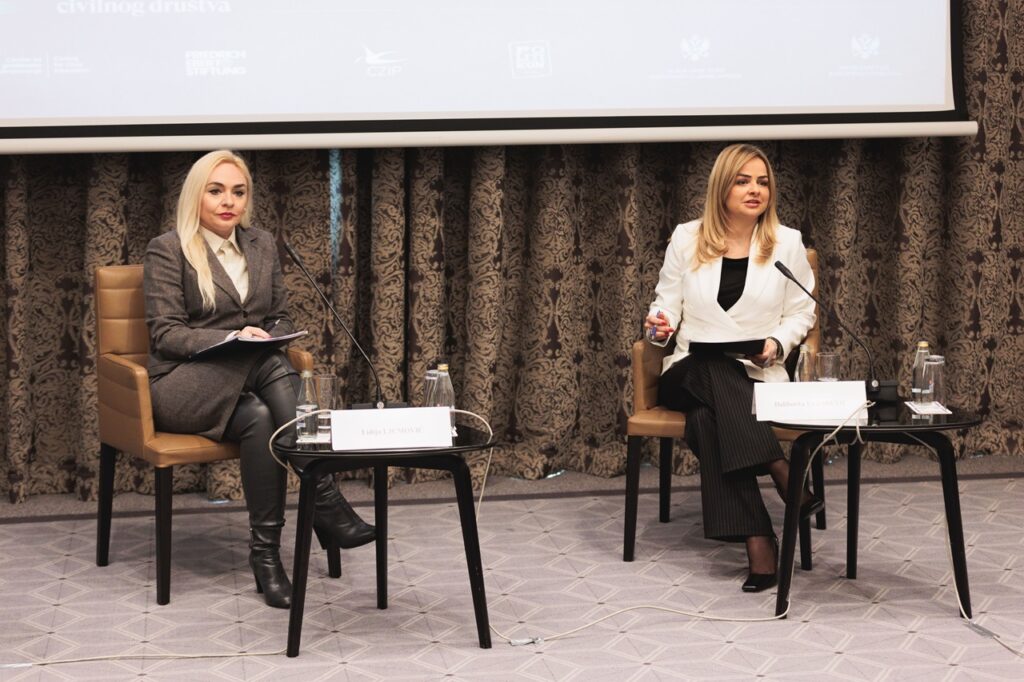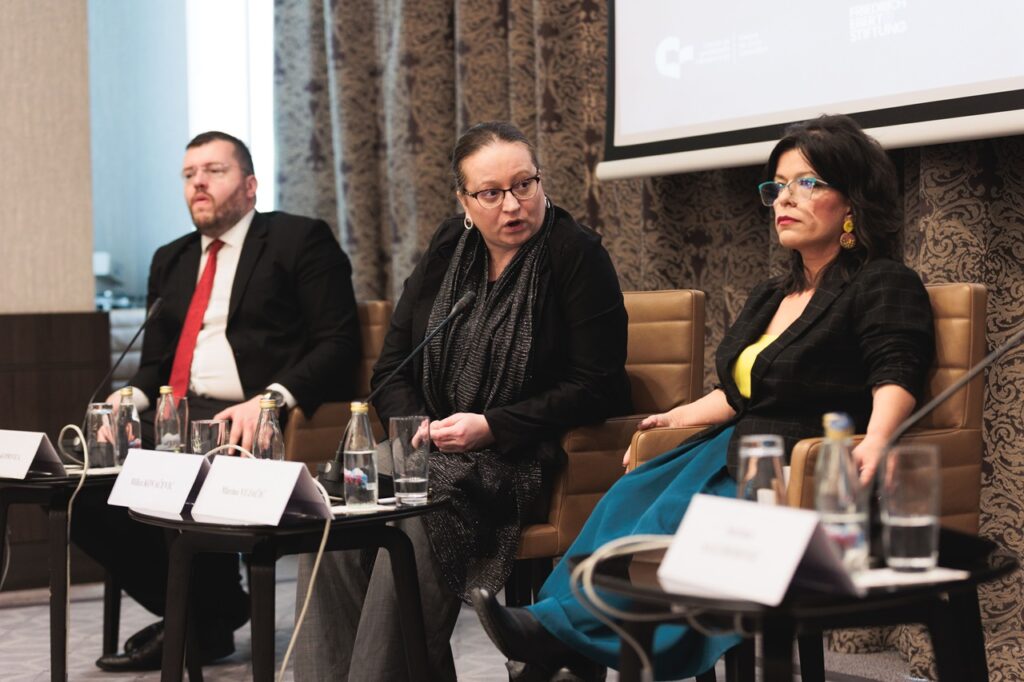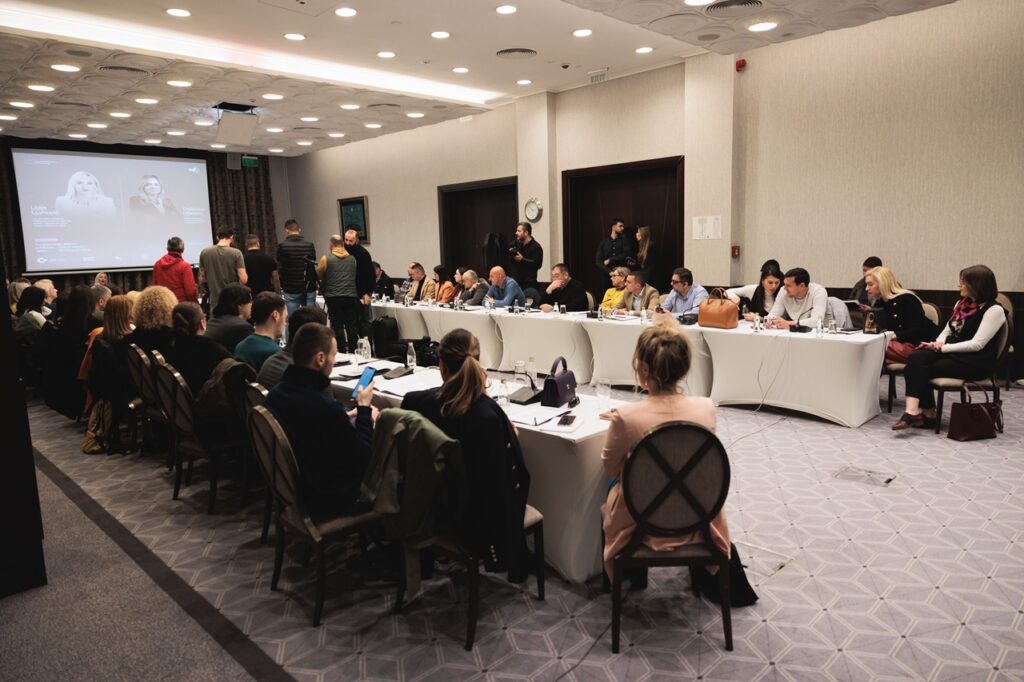Campaigns conducted in recent years against critically oriented non-governmental organizations seriously endanger the development of civil society, assessed executive director of the Centre for Civic Education (CCE), Daliborka Uljarević.
Speaking at the discussion forum “Democracy in Focus – the Relationship between Government and Civil Society,” organized by the CCE, within the project “NGOs in Montenegro – from Basic Services to Policy Shaping – M’BASE,” with the support of the EU Delegation in Montenegro and the Ministry of Public Administration, Uljarević stated that Montenegro has not managed to democratically consolidate even after four years. “And it seems that the practices of decision-makers do not indicate that there is a unified vision of what kind of state we need,” Uljarević said, explaining that this results in the absence of a roadmap on how to strengthen, democratize, and Europeanize the state, with the additional burden of a low level of political culture.
According to her, it is encouraging that NGOs continue to generate a positive perception among citizens, noting that expectations for them are to be critical of the authorities. Speaking about research conducted by the CCE, as part of the same project, she reminded that the majority of citizens positively assess the work of NGOs, which, as she added, is an increase compared to 2021. However, she also noted a decrease in the perception of those who believe that NGOs are fully or partially independent from the government compared to 2021. She said that negative campaigns conducted by politicians against critically oriented NGOs also result in the perception of a narrowed space for the free operation of NGOs.
Acting Director-General of the Directorate for Development and Cooperation with NGOs at the Ministry of Public Administration, Lidija Ljumović, said that the Government is dedicated to the concept of civil society development and strengthening an enabling environment for NGO work.
She also emphasized the significance of pluralism through expressing different interests and values in the processes of creating public policies. “By involving NGOs as legitimate representatives of citizens in this process, public policies gain greater legitimacy, and directions that enable a quality response to numerous social and economic challenges are jointly defined“, Ljumović said.
Presenting a series of activities that the Ministry will undertake in the coming period, with a focus on the new Law on NGOs, she also said that they are aware of the challenges regarding the register and certain challenges in the NGO registration process. “There is a natural need to improve the existing register. I believe that in the future, we will have a digitalized register of NGOs,” Ljumović explained.Top of Form
She added that the Government has decided on priority areas of public interest and the amount of funds for financing NGO projects for this year, covering 13 areas with over 5.5 million EUR allocated. Additionally, as she mentioned, 1.4 EUR million is allocated for co-financing projects of NGOs held from EU funds. “With these funds, we believe that we will provide sustainability for NGOs. Apart from these funds, we have allocated half a million EUR for the development of resource centres,” Ljumović said.
During the first panel “Collaboration and Conflicts in the Montenegrin Socio-Political Landscape,” Deputy Prime Minister, Momo Koprivica, said that stability is essential for Montenegro, not only political but also social, as it is a prerequisite for achieving Montenegro’s strategic goals, one of which is accession to the European Union (EU).
He said that a lot has been done on the EU front and that clear European perspectives are opening up. “And this obliges us to do everything to overcome all disagreements about some issues at the level of democracy,” Koprivica said.
He stated that in the past, there were examples of consensus, citing the 2006 referendum and the agreement reached in 2023 regarding the census as examples.
Koprivica stressed that the Government is ready to accept argument based criticism, and that this is an indicator of democracy and the freedom of society, emphasizing the importance of the relation between the government and the civil sector for the consolidation of the democratic order. “The Government does not perceive the civil sector as a rival but as a partner,” Koprivica concluded.
President of the NGO Center for Democratic Transition, Milica Kovačević, speaking about how disinformation affects the relationship between the government and the civil sector, said that for years in Montenegro, work has been undertaken to build infrastructure for disinformation.
Kovačević said that the Democratic Party of Socialists (DPS) is rightfully criticized for its lack of transparency and added that the change of government after 2020 should have brought at least democratic relaxation, but it did not happen, which was also reflected in the report of the European Commission.
“This Government has faced many urgent and important issues, but we will see the real situation when the Government faces serious criticism. That exam could happen very soon, and we will see how our criticisms will be accepted then,” Kovačević said.
She believes that the Government has a difficult task ahead to establish trust with the NGO sector, with the impression that there is no dialogue on key issues.
Executive Director of the Association of Youth with Disabilities of Montenegro, Marina Vujačić, pointed out that it is positive, regarding the state’s position towards PWDs, that Montenegro has ratified the UN Convention on the Rights of Persons with Disabilities, as well as that for a long time, it positively marked that PWDs were more aware, but recent trends are not like that. “There are fewer PWDs represented and speaking, and there is the least number of those who criticize,” Vujačić emphasized.
Vujačić assessed that there are also discriminatory and inadequate laws, and that the distribution of funds through NGO competitions is not adequate and must be reformed.
“It should not have happened that every subsequent government, since we have had government turnover, is not better than the previous one,” Vujačić said.
She believes that the Government should involve NGOs, especially representative NGOs, in the decision-making process.
MINA



